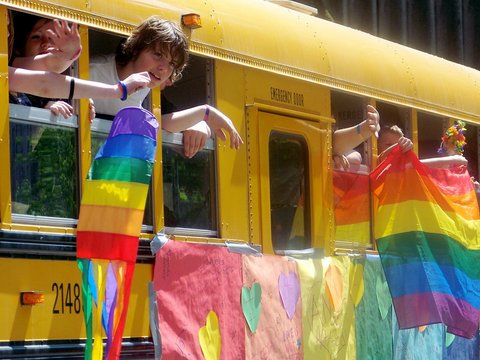
25 Jun I Thought Pride Didn’t Include Me. I Was Wrong

Seeing fellow students celebrating the LGBTQ+ community, like these ones commemorating Seattle Pride in 2008, made a major impact on the author. (“Gay-Straight Alliance school bus” by jglsongs via Flickr / CC BY 2.0 license)
Commentary, Anushka Devanathan
Every June, my school library displays rainbow-colored books. Tables are decked with tiny pins and colorful badges, usually left untouched. Rainbow-colored bookmarks, stickers and posters line the walls to no avail. Students at my school often walk past it all without a second thought.
Many assume that if you’re not queer, there’s no reason to participate in Pride Month. Pride is not just someone else’s thing, so why do so many of us treat it like that? Even if you’re cisgender and straight, Pride Month should matter to you. It is meant to be a statement, a protest against the discrimination faced by queer people, not necessarily a representation of who you are.
Pride Month is held in June to commemorate the Stonewall Uprising, which began June 28, 1969, in New York City. Police raided the Stonewall Inn, a gay bar, but the people fought back.
Although, over time, this month has become more celebratory, the sentiment of it has never changed — protest.
While a lot of progress has been made, the fight for LGBTQ+ rights and acceptance continues still.
Transgender women of color like Marsha P. Johnson and Sylvia Rivera were leaders in the fight for LGBTQ+ rights at Stonewall, but they were largely ignored back then in favor of cisgender, white, gay men. In February, they were erased from history as the National Park Service deleted mentions of transgender and queer people from its Stonewall National Monument webpage, according to CNN. And it’s not the only federal agency to have gone from officially recognizing LGBTQ+ people to just LGB.
According to a 2024 survey held by the Center for American Progress, nearly half of transgender adults reported experiencing discrimination in public spaces. Harassment is still continuing today, and even though we may not see it, it’s still happening. We can’t stop every blow, but we can speak up against it and raise awareness.
I finally realized just recently what kind of impact raising awareness can make.
I used to be one of those students walking by the tables, ignoring something I wrongly assumed shouldn’t matter to me. I was absorbed in my own world, and believed that since I was straight, I was separate from the LGBTQ+ community. I assumed that one’s involvement was based on their sexuality.
That changed on April 11, the Day of Silence.
Students – including many who weren’t LGBTQ+ — pinned bright rainbows to the fronts of their shirts or on their backpacks and remained silent during class, even during lunch. What surprised me wasn’t the act, it was the people doing it. People just like me were pinning colorful badges on themselves. The silence was louder than anything people could have said.
I caught myself wondering: Why didn’t I wear one of those badges? Why couldn’t I be one of those students representing Pride while staying silent? It took me a while to realize that that was the point. When someone like me makes a statement — wearing a badge, staying quiet — someone notices and it leaves a lasting impression on them. In this case, it was me.
Supporting pride doesn’t have to be an extravagant celebration. Wearing a pin, reading a book, learning about its history — the most important part is showing involvement. What we need to show is that we care. What matters isn’t how big the gesture was, but the fact that you made one. I’ve seen firsthand how a simple pin stuck to a shirt can make someone pause and think, and can make a difference. Whether you identify as straight or cis, your voice and your support still matter. Pride is about protest. It’s about visibility. It’s about making a statement. But most of all it’s about standing up for yourself and others.





No Comments